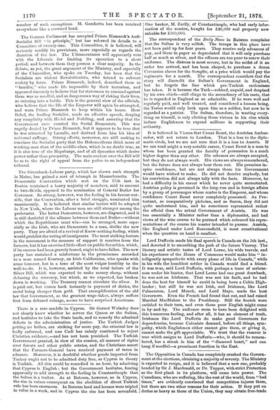The Greenback-Labour party, which has shown such strength in Maine,
has gained a sort of triumph in Massachusetts. The Democratic Convention which met on the 17th inst. in Boston contained a heavy majority of members, said to amount to two-thirds, opposed to the nomination of General Butler for Governor. So strong, however, was the feeling in his favour out- side, that the Convention, after a brief struggle, nominated him unanimously. It is believed that similar tactics will be adopted in New York, where the Labour men are still stronger among the proletariat. The better Democrats, however, are disgusted, and it is still doubtful if the alliance between them and Butler—without which the Republicans must win—can be arranged, more espe- cially as the Irish, who are Democrats to a man, dislike the new party. They are afraid of a revival of Know-nothing feeling, which would prohibit the voting of immigrants. The most striking feature in the movement is the measure of support it receives from the farmers, but it has exercised little effect on public Securities, which, if its success had been gravely feared, ought to have fallen. The new party has sustained a misfortune in the prominence accorded to a man named Kearney, an Irish Californian, who speaks with some humour, but in a tone of the most vulgar hostility to the well-to-do. It is, however, assisted by the total failure of the Silver Bill, which was expected to make money cheap, without debasing the currency, but which, as we expected, has broken down in working. The Treasury cannot circulate the silver. It is paid out, but comes back instantly in payment of duties, the metal being cheaper than gold. That exemplification of the old law that Government, as the greatest wage-taker, always suffers first from debased coinage, seems to have surprised Americans.






























 Previous page
Previous page